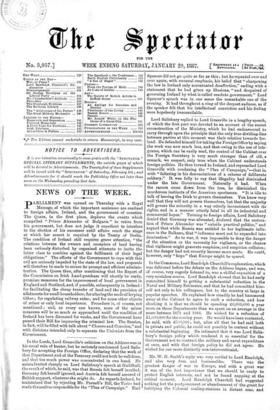Lord Salisbury replied to Lord Granville in a lengthy speech,
of which the first part was devoted to an account of the recent reconstruction of the Ministry, which he had endeavoured to carry through upon the principle that the only true dividing-line between parties at this moment was their relation towards Ire- land. He defended himself for taking the Foreign Office by saying the work was now much less, and that owing to the use of tele- grams, which can be easily read, the control of the Cabinet over the Foreign Secretary is very much stronger than of old, a remark, we suspect, only true when the Cabinet understands foreign politics. He then turned to Ireland, and reproached Lord Granville with condoning the " Plan of Campaign,"—that is, with "faltering in his denunciations of a scheme of deliberate robbery." It was folly to say that illegality had diminished under the late Government. Naturally it had. When the racoon came down from the tree, he diminished the murderous instincts of the American sportsman. "It is idle to talk of leaving the Irish to govern themselves. You know very well that they will not govern themselves, but that the majority will govern the minority in a way utterly inconsistent with its rights, and in a manner utterly fatal to all its industrial and commercial hopes." Turning to foreign affairs, Lord Salisbury denied that Germany was alienated, declared that the restora- tion of Prince Alexander was " outside practical polities," and argued that while Russia was entitled to her legitimate influ- ence in the Balkans, that "influence must not be expanded into domination." As to war, it was impossible to deny the danger of the situation or the necessity for vigilance, or the chance that vigilance might generate suspicion, and suspicion collision; but the danger had not recently become more acute. He could, however, only " hope " that Europe might be spared.






































